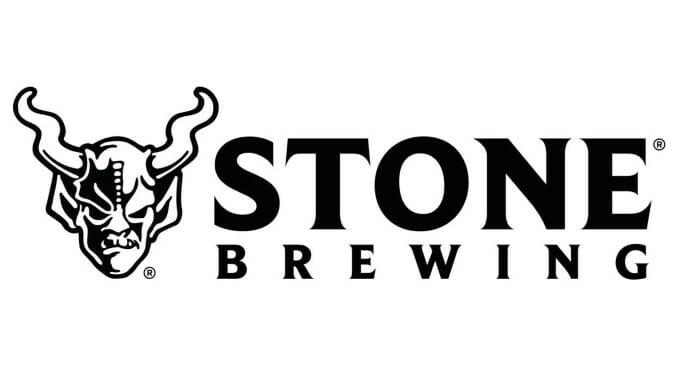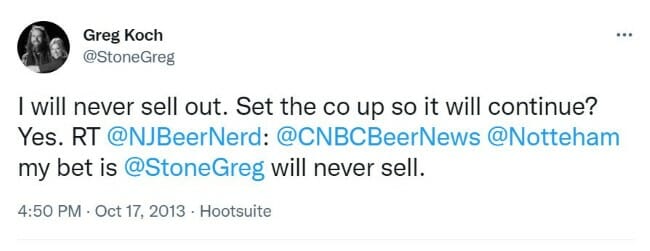Stone Brewing Has Officially Sold Out to Sapporo, Ending 26 Years of Independence

In the world of American craft beer, there has never been a brewery that trumpeted its independence and disdain for “sellouts” louder than Stone Brewing Co. For decades, Greg Koch’s company ridiculed those breweries that sold or were acquired by “Big Beer,” portraying themselves as valorous knights in a grand fight against an evil empire.
And then times got hard, and Greg Koch and Stone sold out.
Perhaps if this had happened 10 years ago, we might have felt some iota of surprise. Stone, as a company, plied its “you’re not worthy” and “anti-corporate beer” shtick for decades with much success, selling stickers that read “never sell out,” among other things. There’s a time when news that the company was fully merging with Sapporo U.S.A. would have been shocking. But that time is long since past, and we have long since entered an age when brewery sellouts are no longer punished, but simply shrugged at. Stone is just the latest in a long line of breweries to do what they said they never would, in the wake of economic turmoil and painful reverberations throughout the beer industry. They join the likes of New Belgium, Bell’s, CANarchy, SweetWater and other industry giants that have all given away their independence to giant corporations in the last few years.
In doing so, the biggest players in the “craft beer” space have effectively made the argument that none of them consider the term “craft brewer,” as defined by the Brewers Association, to have any value in the modern era. The BA has tried to maintain its status as an arbiter of who is and isn’t a craft brewer, but top 10 companies in terms of size have routinely cast aside their ability to qualify by selling to larger, non-craft brewers. If the likes of Bell’s and Stone don’t care whether the BA views them as a craft brewer, or the fact that their production statistics will no longer be included in the BA’s year-end reports, then how can one argue the term has any value? As we’ve been saying since 2019 at this point, the words “craft beer” have effectively become so muddied that they’re now meaningless, co-opted by the mega-corporations that were initially threatened by the rise of independent American brewing companies. All these years later, it’s safe to say that Big Beer won, in no uncertain terms.
As for Stone, though, the hypocrisy of them selling was always going to be a special kind of grating, if only because Koch had so strenuously insisted for so many years that his company never would. We’re not talking about insinuations, here—he literally would say things like “I will never sell out.”

In fact, Stone once produced an entire video with Koch as he described their choice to never sell out, and their heroic struggle against the bad guys of the industry.
So, how did we get to Stone now being owned by Sapporo, then? Well, the market finally cooled off for one, and Stone, like so many of the other big West Coast players, seemed to bite off more than they could chew in a series of aggressive expansions in the back half of the 2010s. As the decade came to a close, craft beer growth became less rapid, and an ever-growing number of small breweries began cannibalizing the segment. Growth was now going to “that little brewery down the street” rather than regional or national craft breweries available in all 50 states. Companies like Stone, meanwhile, were being stung by the very “drink small, drink local” ethos they had helped foster for decades.
In short order, headlines involving Stone seemed to turn overwhelmingly stressed and negative. The company launched a brewery incubation fund in 2016, which closed in 2019 without ever investing in another brewery. Their splashy Berlin brewery closed in 2019 as well after less than five years in operation, with Koch admitting that the European market had been harder to crack than anticipated. The company became embroiled in a long legal proceeding with Molson Coors over the branding of Keystone Light, ultimately being awarded $56 million earlier this year … which was still far less than they needed to pay off huge amounts of outstanding debt. One has to imagine the sale to Sapporo was a way for Koch to escape the whole situation without effectively losing his shirt. Along the way, the Stone brand also lost fans for other reasons, including the fact that they became notably litigious against smaller craft breweries, while simultaneously claiming they were the victims of Big Beer litigation.
Regardless, the sale ends 26 years of Stone as an iconic, independent American brewery, one of the companies that most illustrated the attitude of the craft beer boom of the 2000s. As part of the deal, Sapporo U.S.A. will produce its own branded beers for U.S. distribution in Stone’s two major U.S. breweries in Escondido, California and Richmond, Virginia. In fact, according to the press release, Sapporo plans to brew 360,000 barrels of its own beer in the U.S. by the end of 2024, effectively doubling the production happening in Stone breweries. Naturally, Stone will continue production of its own beers in these facilities as well, and continue to operate its seven Tap Rooms and World Bistro & Gardens locations, “with existing branding, management and workforce under the Sapporo umbrella.” This is all to be expected—these mega corporations have long since learned that leaving existing structure in place is key to making sure that consumers don’t object to brewery buyouts.
What does Koch say about all this? About what can only be interpreted as a defeat, after 26 years of proudly trumpeting his untouchability as an incorruptible craft beer leader? Turns out he’s really psyched about the new opportunity!
“This is the right next chapter for Stone Brewing,” said Koch in a notably brief statement. “For 26 years, our amazing team has worked tirelessly to brew beers that have set trends and redefined expectations. To have the interest of a company like Sapporo in continuing the Stone story is a testament to the great beers we’ve created and will continue to create for our fans across the globe.”
And that, folks, is what it sounds like when times in the beer industry get tough, and principles go out the window to make way for the realities of running a business. Like I wrote before: We’re not surprised at any of this, not anymore. When three or four of the top “craft brewers” of 2021 in terms of the Brewers Association definition already no longer qualify for that title, it’s clear that the age of the “craft brewer” is a thing of the past.
Note: Koch has now posted a longer blog post on the Stone website, attempting to justify the sale.
Jim Vorel is a Paste staff writer and resident beer and liquor geek. You can follow him on Twitter for more drink writing.






































